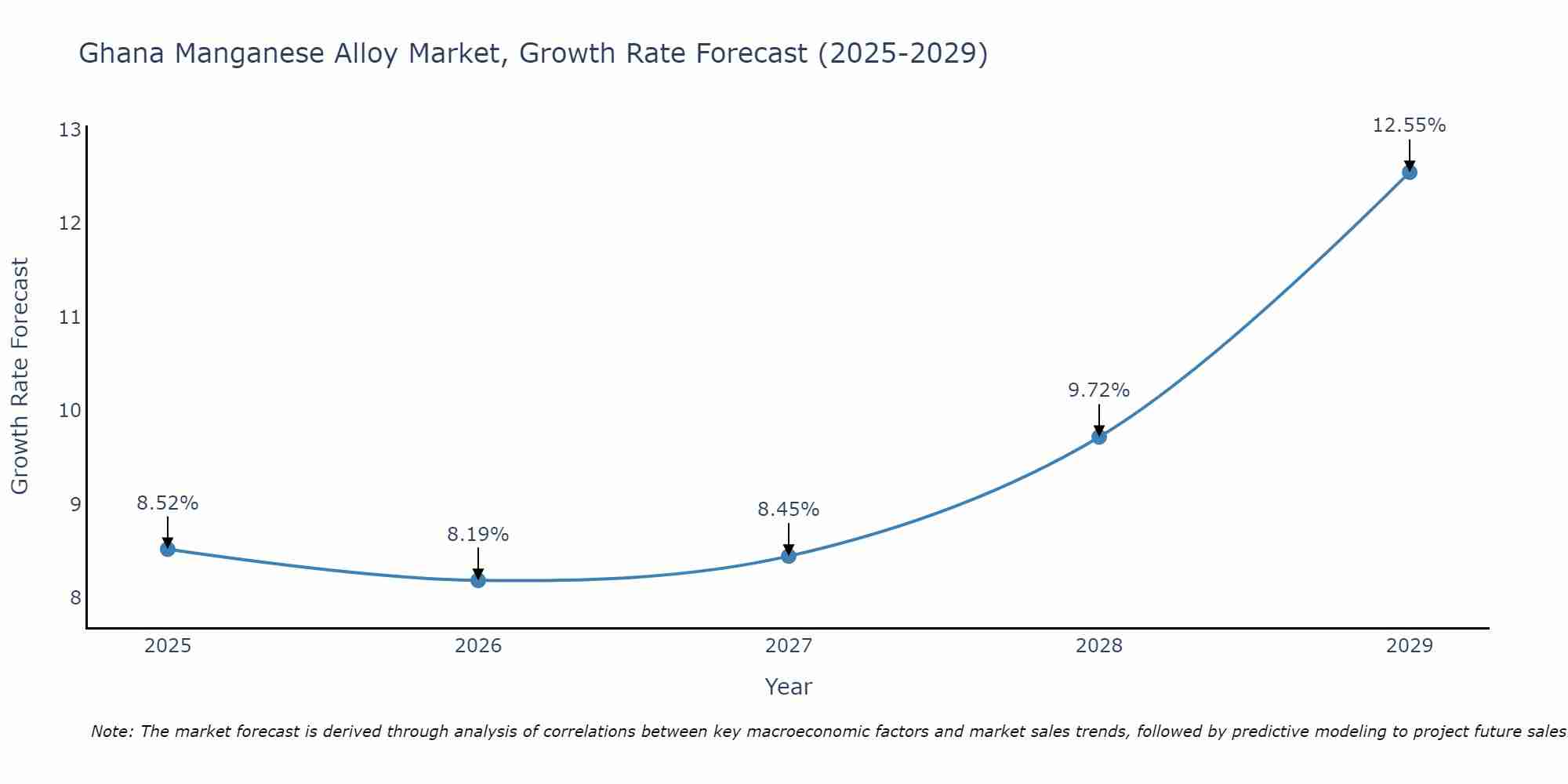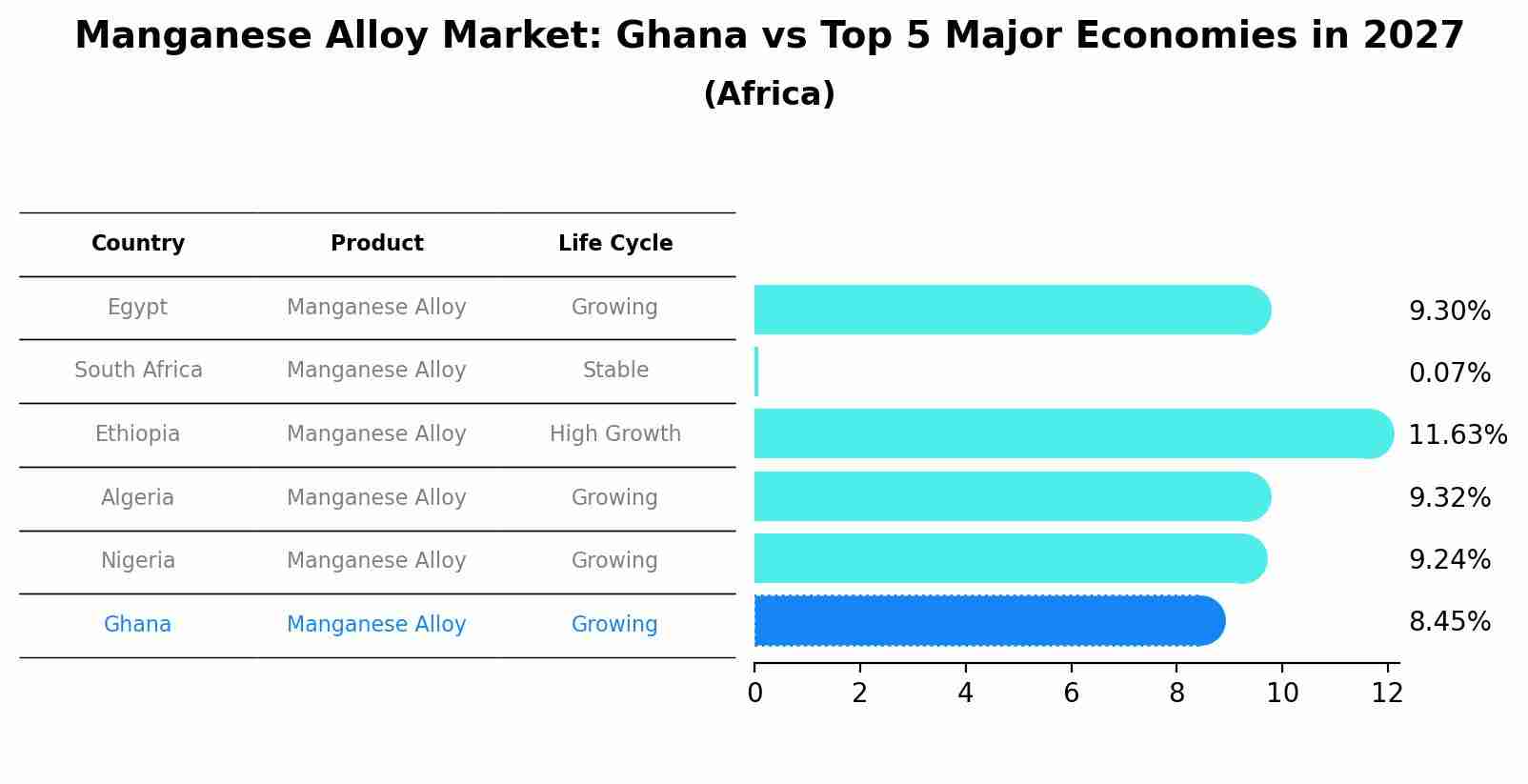Ghana Manganese Alloy Market (2025-2031) Outlook | Forecast, Industry, Size, Analysis, Companies, Revenue, Share, Trends, Growth & Value
| Product Code: ETC091875 | Publication Date: Jun 2021 | Updated Date: Jun 2025 | Product Type: Report | |
| Publisher: 6Wresearch | Author: Shubham Padhi | No. of Pages: 70 | No. of Figures: 35 | No. of Tables: 5 |
Ghana Manganese Alloy Market Size Growth Rate
The Ghana Manganese Alloy Market is projected to witness mixed growth rate patterns during 2025 to 2029. From 8.52% in 2025, the growth rate steadily ascends to 12.55% in 2029.

Manganese Alloy Market: Ghana vs Top 5 Major Economies in 2027 (Africa)
The Manganese Alloy market in Ghana is projected to grow at a growing growth rate of 8.45% by 2027, within the Africa region led by Egypt, along with other countries like South Africa, Ethiopia, Algeria and Nigeria, collectively shaping a dynamic and evolving market environment driven by innovation and increasing adoption of emerging technologies.

Ghana Manganese Alloy Market Overview
The Ghana Manganese Alloy Market is experiencing steady growth driven by increasing demand from various industries such as steel production, construction, and automotive sectors. Ghana is a significant player in the global manganese alloy market with its rich manganese reserves and mining operations. The country`s strategic location and well-established infrastructure have positioned it as a key supplier in the West African region. The market is characterized by a competitive landscape with several domestic and international players vying for market share. Factors such as technological advancements, government policies, and fluctuating raw material prices are influencing market dynamics. Overall, the Ghana Manganese Alloy Market is poised for further expansion as industrial activities and infrastructure development continue to drive demand for manganese alloys.
Ghana Manganese Alloy Market Trends
The Ghana Manganese Alloy Market is experiencing growth due to increasing demand from industries such as steel production, construction, and automotive. With the global push towards sustainable practices, there is a rising focus on environmentally friendly manganese alloys that offer high strength and durability. Market players are investing in research and development to innovate new alloy compositions that meet these requirements. Additionally, the government`s initiatives to promote local manufacturing and infrastructure development are driving the market further. However, challenges such as fluctuating raw material prices and competition from international players remain key factors influencing the market dynamics. Overall, the Ghana Manganese Alloy Market is poised for steady growth in the coming years as industries continue to rely on manganese alloys for their essential applications.
Ghana Manganese Alloy Market Challenges
In the Ghana Manganese Alloy Market, some of the key challenges faced include fluctuating global manganese prices, inconsistent power supply leading to production disruptions, inadequate infrastructure for transportation and logistics, regulatory uncertainties, and competition from other manganese-producing countries. These challenges can affect the profitability and sustainability of manganese alloy producers in Ghana, impacting their ability to compete effectively in the global market. Additionally, environmental concerns related to mining activities and community relations issues can further complicate operations in the Ghanaian manganese alloy industry. Overcoming these challenges would require investments in infrastructure, improvements in power supply reliability, regulatory clarity, and sustainable practices to ensure long-term growth and success in the market.
Ghana Manganese Alloy Market Investment Opportunities
In the Ghana Manganese Alloy Market, there are several investment opportunities for interested investors. One potential opportunity lies in investing in manganese mining and production companies operating in Ghana. These companies play a crucial role in the supply chain of manganese alloys, which are essential in the production of steel and other industrial applications. Another investment avenue is in infrastructure development to support the growth of the manganese alloy industry in Ghana, such as transportation and logistics systems. Additionally, investing in research and development of new technologies and processes for manganese alloy production can also be a lucrative opportunity in this market. Overall, the Ghana Manganese Alloy Market presents promising investment prospects for those looking to capitalize on the country`s rich mineral resources and growing industrial sector.
Ghana Manganese Alloy Market Government Policy
Government policies related to the Ghana Manganese Alloy Market include the Minerals and Mining Act of 2006, which regulates the mining sector and governs the acquisition and disposal of mineral rights. The Minerals Commission is responsible for overseeing mining activities, issuing licenses, and ensuring compliance with environmental and safety standards. Additionally, the government has implemented the Local Content and Local Participation Policy, which aims to promote the participation of Ghanaians in the mining industry and ensure the transfer of technology and skills to local communities. These policies are designed to attract investment, promote sustainable mining practices, and maximize the economic benefits of the manganese alloy market for the people of Ghana.
Ghana Manganese Alloy Market Future Outlook
The future outlook for the Ghana Manganese Alloy Market is positive, with steady growth expected in the coming years. The increasing demand for manganese alloys in various industries such as steel production, construction, and automotive sectors is driving market growth. Additionally, Ghana`s abundant manganese reserves and the government`s focus on promoting the mining industry are likely to attract investments and boost production capacity. The country`s strategic location in West Africa, coupled with improving infrastructure and economic stability, further enhances the market`s potential for expansion. However, challenges such as fluctuating manganese prices and regulatory uncertainties may pose some risks to market growth. Overall, the Ghana Manganese Alloy Market is poised for growth, driven by increasing industrialization and favorable market conditions.
Key Highlights of the Report:
- Ghana Manganese Alloy Market Outlook
- Market Size of Ghana Manganese Alloy Market, 2021
- Forecast of Ghana Manganese Alloy Market, 2031
- Historical Data and Forecast of Ghana Manganese Alloy Revenues & Volume for the Period 2021 - 2031
- Ghana Manganese Alloy Market Trend Evolution
- Ghana Manganese Alloy Market Drivers and Challenges
- Ghana Manganese Alloy Price Trends
- Ghana Manganese Alloy Porter's Five Forces
- Ghana Manganese Alloy Industry Life Cycle
- Historical Data and Forecast of Ghana Manganese Alloy Market Revenues & Volume By Type for the Period 2021 - 2031
- Historical Data and Forecast of Ghana Manganese Alloy Market Revenues & Volume By Ferro-Manganese for the Period 2021 - 2031
- Historical Data and Forecast of Ghana Manganese Alloy Market Revenues & Volume By Metallic Manganese for the Period 2021 - 2031
- Historical Data and Forecast of Ghana Manganese Alloy Market Revenues & Volume By Nickel-Manganese Alloy for the Period 2021 - 2031
- Historical Data and Forecast of Ghana Manganese Alloy Market Revenues & Volume By Nitrided Manganese Alloy for the Period 2021 - 2031
- Historical Data and Forecast of Ghana Manganese Alloy Market Revenues & Volume By Silico-Manganese for the Period 2021 - 2031
- Historical Data and Forecast of Ghana Manganese Alloy Market Revenues & Volume By Iron-Manganese Alloys for the Period 2021 - 2031
- Historical Data and Forecast of Ghana Manganese Alloy Market Revenues & Volume By Application for the Period 2021 - 2031
- Historical Data and Forecast of Ghana Manganese Alloy Market Revenues & Volume By Foundry for the Period 2021 - 2031
- Historical Data and Forecast of Ghana Manganese Alloy Market Revenues & Volume By Steel for the Period 2021 - 2031
- Historical Data and Forecast of Ghana Manganese Alloy Market Revenues & Volume By Superalloys for the Period 2021 - 2031
- Historical Data and Forecast of Ghana Manganese Alloy Market Revenues & Volume By Welding Electrodes for the Period 2021 - 2031
- Historical Data and Forecast of Ghana Manganese Alloy Market Revenues & Volume By End-users for the Period 2021 - 2031
- Historical Data and Forecast of Ghana Manganese Alloy Market Revenues & Volume By Medical for the Period 2021 - 2031
- Historical Data and Forecast of Ghana Manganese Alloy Market Revenues & Volume By Mining Industry for the Period 2021 - 2031
- Historical Data and Forecast of Ghana Manganese Alloy Market Revenues & Volume By Chemical Industry for the Period 2021 - 2031
- Historical Data and Forecast of Ghana Manganese Alloy Market Revenues & Volume By Machinery Manufacturing Industry for the Period 2021 - 2031
- Ghana Manganese Alloy Import Export Trade Statistics
- Market Opportunity Assessment By Type
- Market Opportunity Assessment By Application
- Market Opportunity Assessment By End-users
- Ghana Manganese Alloy Top Companies Market Share
- Ghana Manganese Alloy Competitive Benchmarking By Technical and Operational Parameters
- Ghana Manganese Alloy Company Profiles
- Ghana Manganese Alloy Key Strategic Recommendations
Frequently Asked Questions About the Market Study (FAQs):
- Single User License$ 1,995
- Department License$ 2,400
- Site License$ 3,120
- Global License$ 3,795
Search
Related Reports
- Australia IT Asset Disposal Market (2025-2031) | Strategy, Consumer Insights, Analysis, Investment Trends, Opportunities, Growth, Size, Share, Industry, Revenue, Segments, Value, Segmentation, Supply, Forecast, Restraints, Outlook, Competition, Drivers, Trends, Demand, Pricing Analysis, Competitive, Strategic Insights, Companies, Challenges
- UAE Building Thermal Insulation Market Outlook (2025-2031) | Revenue, Companies, Share, Trends, Growth, Size, Forecast, Industry, Analysis & Value
- Portugal Electronic Document Management Market (2025-2031) | Strategy, Consumer Insights, Analysis, Investment Trends, Opportunities, Growth, Size, Share, Industry, Revenue, Segments, Value, Segmentation, Supply, Forecast, Restraints, Outlook, Competition, Drivers, Trends, Demand, Pricing Analysis, Competitive, Strategic Insights, Companies, Challenges
- France Electronic Document Management Market (2025-2031) | Strategy, Consumer Insights, Analysis, Investment Trends, Opportunities, Growth, Size, Share, Industry, Revenue, Segments, Value, Segmentation, Supply, Forecast, Restraints, Outlook, Competition, Drivers, Trends, Demand, Pricing Analysis, Competitive, Strategic Insights, Companies, Challenges
- Portugal Occupational Health & Safety Services Market (2025-2031) | Strategy, Consumer Insights, Analysis, Investment Trends, Opportunities, Growth, Size, Share, Industry, Revenue, Segments, Value, Segmentation, Supply, Forecast, Restraints, Outlook, Competition, Drivers, Trends, Demand, Pricing Analysis, Competitive, Strategic Insights, Companies, Challenges
- Netherlands Occupational Health and Safety Services Market (2025-2031) | Strategy, Consumer Insights, Analysis, Investment Trends, Opportunities, Growth, Size, Share, Industry, Revenue, Segments, Value, Segmentation, Supply, Forecast, Restraints, Outlook, Competition, Drivers, Trends, Demand, Pricing Analysis, Competitive, Strategic Insights, Companies, Challenges
- Belgium and Luxembourg Facility Management Market (2025-2031) | Strategy, Consumer Insights, Analysis, Investment Trends, Opportunities, Growth, Size, Share, Industry, Revenue, Segments, Value, Segmentation, Supply, Forecast, Restraints, Outlook, Competition, Drivers, Trends, Demand, Pricing Analysis, Competitive, Strategic Insights, Companies, Challenges
- Russia Women Intimate Apparel Market (2025-2031) | Strategy, Consumer Insights, Analysis, Investment Trends, Opportunities, Growth, Size, Share, Industry, Revenue, Segments, Value, Segmentation, Supply, Forecast, Restraints, Outlook, Competition, Drivers, Trends, Demand, Pricing Analysis, Competitive, Strategic Insights, Companies, Challenges
- Africa Chocolate Market (2025-2031) | Size, Share, Trends, Growth, Revenue, Analysis, Forecast, industry & Outlook
- Global Hydroxychloroquine And Chloroquine Market (2025-2031) | Industry, Trends, Size, Outlook, Growth, Value, Companies, Revenue, Analysis, Share, Forecast
Industry Events and Analyst Meet
Our Clients
Whitepaper
- Middle East & Africa Commercial Security Market Click here to view more.
- Middle East & Africa Fire Safety Systems & Equipment Market Click here to view more.
- GCC Drone Market Click here to view more.
- Middle East Lighting Fixture Market Click here to view more.
- GCC Physical & Perimeter Security Market Click here to view more.
6WResearch In News
- Doha a strategic location for EV manufacturing hub: IPA Qatar
- Demand for luxury TVs surging in the GCC, says Samsung
- Empowering Growth: The Thriving Journey of Bangladesh’s Cable Industry
- Demand for luxury TVs surging in the GCC, says Samsung
- Video call with a traditional healer? Once unthinkable, it’s now common in South Africa
- Intelligent Buildings To Smooth GCC’s Path To Net Zero













